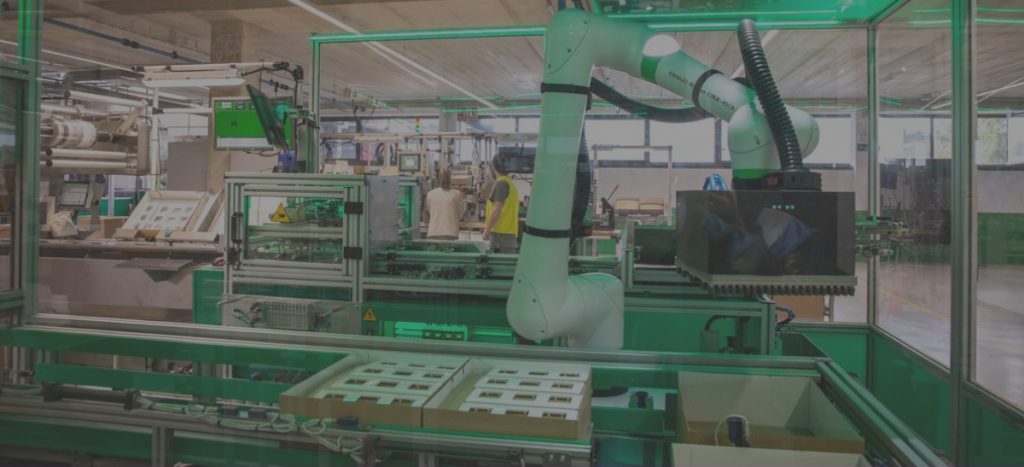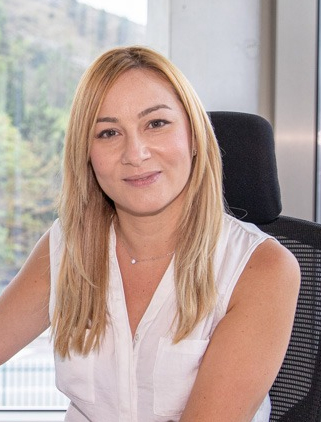
Schneider Electric arrived 30 years ago in Navarra through a strategic acquisition that allowed it to expand its product portfolio. Over these three decades, it has invested in the plant to increase its production capacity and its level of progress as a Smart Factory. Today, the factory is a benchmark in terms of sustainability thanks to initiatives such as the first industrial microgrid installed in a Spanish factory, which was inaugurated last January. In this interview, we talk to Raquel Gascó, Plant Manager of the factory in Puente la Reina, to find out about the plant’s trajectory, how it currently fits into the multinational’s plans and what opinion they have of Navarra’s industrial ecosystem.
The factory where we currently are based in Navarra started operating in 1974 as Eunea, but we had to wait almost 20 years for Schneider Electric to acquire it. At that time, that acquisition was strategic for the multinational because it allowed it to expand its product portfolio by adding new references to its offer.
Proximity is one of the key factors of our success. Being closer to customers and suppliers allows us to respond better to uncertainty and to know in depth the specific requirements of each region in order to adapt our activity.
In particular, being located in Spain, and, within Spain, having several production centers in different locations gives us access to a very diverse critical mass of talent, a talent that in Spain is broad and versatile.
Last month the group carried out an internal audit to measure the performance and production capacity of our factory. With the results obtained in the audit we were rated in the top 11 among the group’s most advanced factories, a very remarkable position considering that Schneider Electric has more than 200 production centers worldwide.
In any case, in the field of multinationals there is no room for relaxation and nothing can be taken for granted. In fact, this healthy competition between the different production centers is one of the key factors that explains why Schneider Electric is the high-performance company it is today, and in Puente la Reina we must continue working to maintain our good performance.
During these years the factory has gone through many milestones. I would highlight the introduction to the market of different product ranges, such as the Unica series of residential electrical mechanisms, or the Odace and Novalis series. These launches took place at a time of a very important paradigm shift for us, because our production went from being 85% destined for the domestic market to 85% for the export market.
The factory’s digitalization process has been also significant. All processes were 100% manual or semi-automatic twelve years ago. Today, however, ours is a digital and connected factory, recognized as one of the most advanced in the group worldwide.
Finally, I would highlight the transition towards sustainability that the factory started in 2012 by driving the reduction of energy consumption or optimizing the use of renewable energy sources. Among other actions, this strategy led us to launch the first industrial microgrid installed in a Spanish factory. This action has been a clear differentiating factor for the factory at European level and we have been able to make it a reality thanks to the support of a important partner for us, also located in Navarra: Acciona Energía.
It responds to the urgency to react actively within the framework of ‘There is no planet B’ movement. At Schneider Electric we are aware of our responsibility, we really believe in sustainability from a proactive point of view and we want to be protagonists in that process. In addition, this microgrid offers us the possibility of reducing energy consumption and optimizing energy use, as well as reducing the CO2 footprint.
When talking about this project, we must highlight the value of our partners. Acciona Energía is the owner of the installation. They assumed the cost of the investment and nowadays follow an “energy as a service” approach, so we pay for the energy we consume. I often say that at Schneider Electric we are good at producing switches and continuously improving our plant to make it a Smart Factory. That’s what we are good at and that’s what we do. That’s why we rely on Acciona Energy to manage the green energy we consume in the factory.
We follow an ambitious roadmap. Our goal is to achieve carbon neutrality in our operations by 2025 and to be a net zero CO2 emitter by 2030, which means that we will no longer pay offsets for emissions. The challenge does not end there. By 2040 we want to achieve carbon neutrality in the entire supply chain and, what is undoubtedly the biggest challenge, by 2050 we want to be a net emitter in all operations in our entire supply chain.
To achieve these goals, we have already started to implement ambitious measures, such as getting rid of single-use plastic, which we will complete by 2025, or replacing our fleet of more than 14,000 vehicles with electric models. In addition, due to their high impact on the environment, we are committed to eliminating the use of CFC gases in our operations by 2025. Last year we launched a plan to measure our sustainability impact and so far the results have been very positive.
I think it is mainly due to resilience and the great work we are doing with different suppliers. Schneider Electric’s supply chain has been rated by Gartner as the best in Europe this year and also the fourth worldwide, so I think this ability to react, this resilience, has made us better than our competitors on many occasions, and has allowed us to gain some market share. In addition, we have been able to increase production capacity at the factory in Puente la Reina when we saw that demand was increasing.
All these associations are very different from one another, but what they all have in common is that they contribute to generating a network space where we can share our problems, listen and learn from others and, at the same time, put on the table what we consider to be our best practices. AIN organizes interesting cross-sector meetings for large companies. In fact, Schneider Electric participated in the last one, where we discussed sustainability. FIN for its part, organizes knowledge roundtables for companies to share best practices and does so following segmentation criteria that allow small companies to talk among themselves and multinationals to have specific roundtables. This level of personalization is a valuable aspect. And I don’t want to forget everything that Confederación Empresarial Navarra provides us with as an agent of business representation.
If we talk in terms of strengths, I would cite the quality of education, especially at the university level, both private and public. And not only universities; we also have outstanding vocational training centers that are training the professional profiles we need in this much more digital environment of smart factories. These centers and universities are generating talent and act as an innovation pool with the capacity to attract more companies.
At the same time, in Navarra there are several technology associations and technology centers that are also very interesting for multinationals to have support in our innovation projects.
In addition, there is another factor that is easy to understand. The very existence of multinationals calls other multinationals because we can usually benefit from the work that others have done before and from the specialization of the supplier network. This is important for us in terms of sustainability, because we want to have suppliers much closer to gain resilience and reduce the impact of CO2 emissions. So I think there is an ecosystem here that can benefit any multinational that wants to have a presence in Spain.
Navarra offers diverse leisure alternatives and, at the same time, a really good gastronomy. In addition, here we can enjoy from an incredible nature. I would also highlight the pleasure of getting to know the important heritage and the historical footprint of Navarre in the hands of honest and loyal people.
The retention of companies responds to the generation of talent for the reasons that I mentioned before, to the presence of universities, to the existence of a very advanced technology due to the innovation pools we have here.
But it is also true that in the field of multinationals nothing can be taken for granted. Today’s good situation does not guarantee that we will always continue like this. Nowadays all the territories and companies face a challenge to guarantee our future. We have the challenge of working much more on the values of companies, and it is a job that must be done individually in each organization. Each company must make an effort to understand what the talent it needs wants, what the new generations demand and what type of company they want to work for, in order to adapt all their strategies and focus them on the mission, that is, on the values of each organization.
And, in this sense, I believe that the government, institutions and associations of the environment must play an active role in helping us to make this transition in terms of culture, digitalization and environmental transition.

